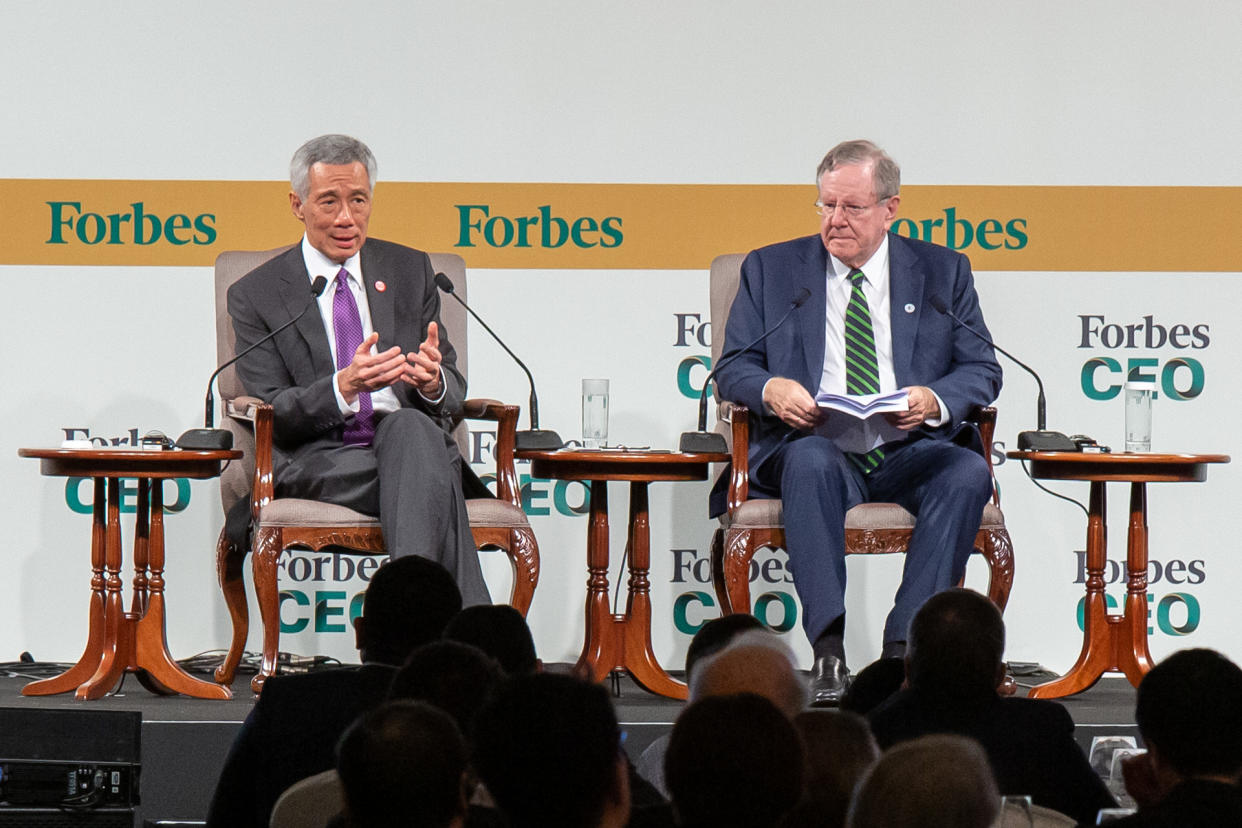Hong Kong must accept status as SAR for 'one country, two systems' to work: Lee Hsien Loong

SINGAPORE — While there is “no easy way forward” to resolve the unrest in Hong Kong, the territory must accept its status as a Special Administrative Region of China in order to sustain its unique system of governance, said Prime Minister Lee Hsien Loong on Wednesday evening (16 October).
“Hong Kong is not a country, it’s a Special Administrative Region. It has to live and work within the Special Administrative Region framework, which is the Basic Law. I think it can be made to work, it’s not easy, but if it’s not made to work, then I think it’s very difficult to imagine that ‘one country, two systems’ can continue for another 22 years, until 2047.”
Lee made his remarks at the two-day Forbes Global CEO Conference, whose theme this year was “Transcending the Turbulence”. The 67-year-old spoke during a dialogue with Steve Forbes, the editor-in-chief of business magazine Forbes. It was Lee’s first appearance at the annual event since 2014.
Forbes had asked Lee to elaborate on the wider implications for Singapore of the ongoing protests in Hong Kong, which are now in their 21st week. Lee stressed that a stable Hong Kong is in the Republic’s best interests. “We thrive best in Singapore when the region is stable, when other countries are prospering and we can do business with them...it’s just the confidence in the whole region, so that investors can come and not think that I’m in a dangerous part of the world.”
He added, “And when Hong Kong is troubled, when there are demonstrations or worse, riots, when the chief executive is booed out of the Legislative Council (LegCo) chamber, I think that’s very sad for Hong Kong and very bad for the region. We look on with concern, we hope Hong Kong will be able to overcome these problems.”
On Wednesday afternoon, Hong Kong chief executive Carrie Lam had to abandon her annual policy address to the Legislative Council after being twice heckled by lawmakers.
And Lee charged that the five major demands of the demonstrators are not meant to be a programme to solve Hong Kong’s problems, but to “humiliate and bring down the government”. He added, “And then what? Well, I think if you press the question, some of them would, if they were candid, would say, ‘I don’t know. But anyway, I am not happy and I want this to happen’. And that’s a most unfortunate state to be in.”
Three key issues
Lee said that, in his estimation, there are three key issues “bugging” Hong Kongers which must be progressively tackled: the workings of the ‘one country, two systems’ model, issues of governance and social issues such as housing.
On the first issue, Lee alluded to one Hong Konger’s remarks, which was met with applause by the audience, “From China’s point of view, they must not only think of one country, but remember this is two systems. And from Hong Kong’s point of view, you must not only think of two systems, but remember that this is one country.”
Secondly, he noted that there has been not been an expansion of suffrage as was envisioned under the Basic Law, which has caused unhappiness. The Basic Law is the constitution of Hong Kong. It lays out, among others, the relationship between the territory and the central government and the fundamental rights and freedoms of Hong Kong residents.
Last of all, Lee said that Hong Kong’s housing crisis is at the bottom of the current unrest. “It’s very expensive, young people can’t afford it. A flat costs 22 years of income, so it’s not practical. And even to rent a space is really expensive, and so people feel, ‘What am I slogging for? Where is the future? Where is the pot of gold?’” This would require radical solutions and a lot of political courage.”
He added, “Before you can make progress, I think it is necessary for temperatures to come down, so that we can get people to work together.”
On Tuesday, Lee told the NTUC National Delegates' Conference that Singapore is not immune to the underlying divisive forces that are at work in places like Hong Kong. The Straits Times reported Lee as saying, "If it happens to us, like what is happening elsewhere, we will suffer the same consequences as the other countries - only worse, because we are that much more vulnerable."
He added that it would then become impossible to govern the Republic or to plan for the long term.
Related stories:
China and US in violent war of words over Hong Kong
Hong Kong protesters intend to topple city's government, says Singapore PM



